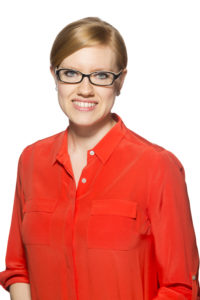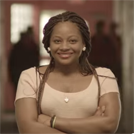
Lindsey Burke
Last week, at the Republican National Convention, it was clear that school choice gives conservatives a positive way to talk about education policy.
But for people who typically want to keep the federal government out of education altogether, what does a national agenda look like?
On the latest edition of our podcast, Lindsey Burke, an education policy fellow at the Heritage Foundation, says there are ways Congress can promote educational choice without expanding the federal government's role.
It can re-allocate existing pots of funding so they follow children to schools of their choice. It can also promote choice-friendly policies in areas where the federal government has clear jurisdiction, such as schools run by the Bureau of Indian Affairs, or the nation's capital, where Congress will be looking to re-authorize a closely watched voucher program this year.
In an interview with Denisha Merriweather, an alumna of the Florida tax credit scholarship program who is now a school choice advocate and graduate student at the University of South Florida, Burke says she wants to see policies that go beyond school choice, allowing parents to customize the entire educational path for their children.
The foundation of that system, she hopes, will be education savings accounts, which allow parents to receive an amount of money — typically 90 percent of what the government would otherwise spend on their child — to cover K-12 educational expenses. They can spend it on individual courses, private school tuition, textbooks or education-related therapies, or save the money to pay for college.
Burke says it's possible that in the future, every child would have an ESA, regardless of where they actually go to school. Many of them might simply choose to enroll in a charter or traditional public school, thus spending their entire account for that year. But if they wanted to switch to a private school or take a mix of courses from different providers, they would have those options, too.

Denisha Merriweather
"We always talk about how there's no sort of magic bullet to what you can do in ed reform," she says. "But I think, in a way, ESAs are sort of that building block that enable all these other reforms to take place — a sort of catalyst for other reforms."
Burke says an ESA-based system, in which funding of public education is controlled by parents, rather than the government or other entities that actually operate of schools, would embody the free-market ideals espoused by Milton Friedman.
It's worth noting, however, that the notion of "divisible vouchers" also had support decades ago among left-leaning academics in California who were animated by civil rights concerns.
And that's why Burke thinks educational choice will eventually find support on both sides of the political aisle.
"I think we're going to see growing bipartisanship, particularly considering so many of the beneficiaries of school choice are kids who are low-income, kids who have not had options before, and now their families do," Burke says. "I think that's a really powerful story."
For now, though, the states creating ESA programs tend to be states in the Sun Belt with fast-growing populations. Arizona, Florida, Mississippi, Tennessee and Nevada offer them, or at least have laws on the books. All but Nevada confine their programs to small groups of students, like those with special needs.
As for states where ESA legislation has the best chance of gaining traction in the near future, Burke suggests keeping an eye on Texas and Oklahoma.
Merriweather is a family advocate at Step Up For Students, which publishes this blog and helps administer Florida's tax credit scholarships, as well as the ESA program for special needs students, known as the Gardiner Scholarship.